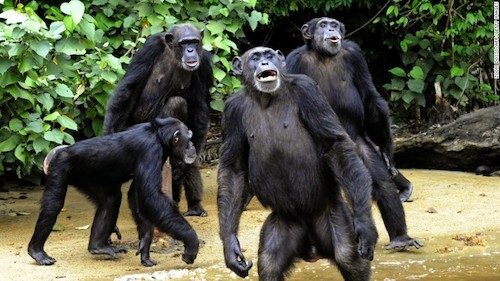The island of chimpanzee dominates
LIBERIA Having survived a medical experiment decades ago, many chimpanzees were abandoned on islands isolated from the world.
In 1974, the film Planet of the Apes (Monkey Planet) starring Charlton Heston was adapted into a series that resonated. However, few people at that time knew that in the remote forest of Liberia, an experiment was starting on an island, where 30 years later would become "the real monkey planet."
It is the work of the nonprofit New York Blood Center (NYBC), one of the largest blood banks in the United States. In search of a vaccine for a range of blood-related diseases, NYBC sponsored Vilab II, a controversial laboratory near the capital Monrovia led by Betsy Brotman, which conducted medical tests on more than 100 chimpanzee.
Chimpanzees were injected with various forms of hepatitis, filariasis (also known as 'river blindness') and a host of other malignancies. Once tested positive for one of these diseases, they will be transferred to one of six different islands. Because they cannot swim, infected chimpanzees will not be able to leave, completely separate from the herd.

The chimpanzees cannot swim, so they just walk along the shore. Photo: Zoom Dosso.
The experiment on animals then faced a wave of intense protest. By 2005, Vilab had stopped working and more than 60 chimpanzees that had been used as test subjects moved to uninhabited mangrove islands in the middle of the Farmington River, where they have lived. People in the area call them Monkey Islands.
For the next 10 years, NYBC continued to look after them, hiring many of the original lab employees to bring food and water to the island once a day.

Joseph Thomas has been a caretaker of chimpanzees for nearly 40 years, since he and his colleagues quit their jobs at the Vilab lab. Joseph often named each chimpanzee so that they in turn receive food as coconuts, cucumbers, pumpkins, pears, bananas, sugarcane ... These animals are closer to humans than their natural counterparts. They have been kept in captivity for too long to survive in the wild. Photo: AP.
In March 2015, NYBC abruptly withdrew its financial support, saying it could not afford to supply its one-time experiments. Luckily, Humane Society decided to accept responsibility for long-term care for chimpanzees, at a cost of up to $ 30,000 a month. By 2017, NYBC is committed to paying £ 5 million (about US $ 6 million) for the chimpanzees' future food and medical needs.
As for Betsy Brotman, despite the unpopular methods, she and her team have successfully developed a hepatitis B vaccine and a screening method for Hep C. In a 2014 interview, Betsy openly sided with animal rights defenders, who struggled to close her lab. The scientist admits he should not experiment on chimpanzees.
Today, many residents of Marshall Village living near Monkey Island fear being attacked by chimpanzees. Some people also speculate that chimpanzees are monsters, ready to attack and even eat anyone who sets foot on the island.
The monkeys were fed and watered once a day. Video: Sholor / YouTube.
Few dare to approach this place, mainly to transport food for the chimpanzees - most no one left the boat. Several curious tourists came here, and had to catch the rain of mangoes from the chimpanzees resolutely defending the territory.
"If it's a stranger, when you get there, they will get aggressive. But one thing about chimpanzees is that they are afraid of water. They can't swim, so they just walk by the water's edge," said Jerry. security guards "of the island, said.
Therefore, tourists are not allowed to go to the island by themselves. You can ask local people for updates on Monkey Island situation, and spend 5 - 10 USD to rent canoes to visit. Success or failure depends on luck, but usually you will find someone who agrees to lead the tour to the island.
FIDITOUR TRAVEL COMMUNICATION COMPANY
Representative: Mr. Tran Van Long - Chairman and General Director
Head office: 95B-97-99 Tran Hung Dao, District 1, City. Ho Chi Minh.
Hanoi Branch: 66 Tran Hung Dao, Hoan Kiem District, Hanoi
Phone: 028 730 56789 | Hotline: 19001177